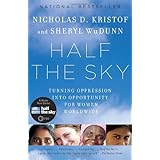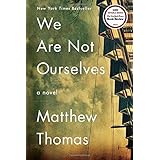
I read it again yesterday, needing something light-hearted after two extremely depressing books:
 and
and 
Both these books were on my "Books Wanted" list, and I requested and received them for Christmas. Although I was somewhat prepared for the heaviness of Half the Sky, I had completely forgotten that We Are Not Ourselves deals with a father's early-onset Alzheimer's and the effects of that terrible disease not only on him, but on his family and friends. If I'd remembered that, I probably wouldn't have read the two books back-to-back (and then watched the Roger Ebert documentary. . .)
After that, I returned to Bernadette and enjoyed it just as much as when I first read it. That's not to say that I wanted to blow off what I'd learned from the two heavier books. On the contrary - after finishing Half the Sky, I went online to see what I could do, and am researching women-focused nonprofits here in Seattle for job openings. In my job search over the past several months, I've applied at nonprofits, but was not focusing solely on them.
I'd always admired Nicholas Kristof's column in The New York Times. He's frank and brave and makes the problems he discusses real by focusing on the personal. He always has sincere empathy for the people he visits, writes about, and tries to help. The book, co-written with his wife Sheryl WuDunn, held the same matter-of-fact intensity as his column.
The title comes from the Chinese proverb "Women hold up half the sky." There are several areas of focus in the book, all concerning female oppression: trafficking/prostitution, rape, and maternal mortality/disease. These problem areas exist due to cultural devaluation of women, and the way out of these horrors is education. Some of the statistics are horrifying, as are some of the individual stories. The resilience of these women, though, is amazing.
Kristof/WuDunn do not just list stats and tell stories, but also offer solutions. This is one book that, although you may not want to read it, you should read it and then figure out what you can do to help. One thing we should all be doing is pressuring our government to ratify CEDAW, the Convention on the Elimination of All Forms of Discrimination. It is unbelievable and appalling that the United States, which regards itself as an enlightened nation, refuses to ratify this "because of Republicans' concerns that CEDAW could nibble away at American sovereignty by surrendering authority to an international convention. These concerns are absurd." (p. 246). CEDAW was adopted by the UN General Assembly in 1979 and 185 countries have approved it - but not the U.S. The solutions Kristof/DuWunn discuss, including education of girls, family planning, micro-finance, and female empowerment, would be fostered by our ratification of CEDAW.
I love the George Bernard Shaw quote that opens Chapter 3: "Reasonable people adapt themselves to the world. Unreasonable people attempt to adapt the world to themselves. All progress, therefore, depends on unreasonable people."
I heartily agree with the authors that improving the lives of others improves our own at the same time. I know from personal experience that the times I felt best about my life were when I was actively helping others.
My one disagreement with the book is the lack of dismay over the Pentecostal boom in the U.S.: "We thus regard the Pentecostal boom with some suspicion, but without doubt it also has a positive impact on the role of women." (p. 143). I say, "Huh?" In the next paragraph they say, "On Sundays, women come together and exchange advice on how to apply community pressure to bring wayward husbands back into line." I wrote in the margin here: "Wow - ain't that somethin'?"
We Are Not Ourselves was hard for me to read not only because I read it immediately after finishing Half the Sky, but because there were so many reminders of what my dad experienced when he had dementia. The wife is walking her husband upstairs when he stops and can't move another step. She struggles to help him raise his leg and move forward. A similar episode happens when he's in the shower, and she can't get him out. His struggle with numbers echoed Dad, who had been so facile with math before his illness, as did his difficulties driving, and the danger he became behind the wheel, his intense stares. It was heart-rending to read how the father/husband, who had always been internal to begin with, tried to keep his illness from his family until he couldn't any longer. I did find it unbelievable that the wife, who had been a nurse for many years, wouldn't have wondered about Alzheimer's sooner than she did, based upon the problems her husband was having.
So yesterday I returned to Bernadette and was immediately enraptured with her spot-on picture of life in Seattle (example: "Hovering over me was the Chihuly chandelier. Chihulys are the pigeons of Seattle.") and her clever, warm-hearted depiction of a smart, quirky family. Bee and her mom (Bernadette) are huge Beatles fans, and the Abbey Road singalong in the car (Bee surprised that her mom knows not only all the words, but the instrumental parts as well) further endeared them to me.
The many blurbs in the front of the book say "laugh-out-loud funny" and this is one of the very few books that made me literally guffaw. I absolutely love it! We need to teach women and girls all over the world to become as self-confident as Bernadette, Bee and the devil/angel neighbor Audrey. They could hold up the sky by themselves.
No comments:
Post a Comment